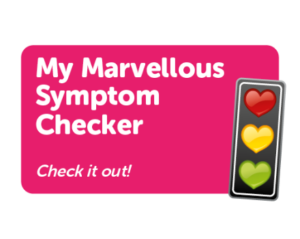Newly Diagnosed
We reckon you are feeling fantastic about the new you. A heart failing, everything you seem to read is negative and therefore, what does the future hold? We reckon you feel as though you need to give up.
Well, of course, you feel down being newly diagnosed with heart failure, but rewind a little. You are not alone. There are 64 million people with heart failure. If you live in the UK, over 1 million have it. In the USA, there are 6 million. I know this doesn’t help, but we are here to instil HOPE. You are not alone.
What we want you to do is listen to what we have to say. We are humans like you with imperfect hearts, and we have rebuilt our jigsaws with the help of others through The Pumping Marvellous Foundation.
A group of our Patient Educators has put together some points to consider that we believe you should know before starting your new journey. There is nothing new about these “points”, but they often get lost in the “mist” you are in when diagnosed. We aim to clear away the clouds of doubt and uncertainty and increase your awareness of your condition. As we all say, “awareness is power’; it provides you with the tools to deal with and manage your symptoms and condition.
Managing your heart failure yourself is very important; this is called self-management, a term you may hear often. In most cases, taking your medication as prescribed by your clinician, along with lifestyle changes, can help your heart function as effectively as possible, assisting you in managing your symptoms.
The heart’s inability to pump blood effectively can lead to many symptoms. Some symptoms people might experience include chest pain, breathlessness during exertion, and swelling of the feet and legs. If you notice any of these symptoms, consult your healthcare provider.
The heart is a complex muscle that operates through a series of electrical impulses and valves. Like a well-tuned engine, it only takes a single malfunction in one of its many components to impair its efficiency, similar to a car’s engine. As with any muscle in the body, the heart must receive oxygen and nutrients to work properly.
Reasons for an inefficient heart:
Coronary heart disease – like a heart attack or angina
Untreated long standing hypertension (high blood pressure)
Cardiomyopathy (your heart muscle weakens)
Heart rhythm disturbance (like atrial fibrillation)
Damaged heart valves (leaky valves)
Congenital heart disease
Myocarditis (inflammation of the heart muscle maybe causedby a virus)
Prolonged alcohol consumption
The use of recreational drugs
Chemotherapy treatment
Pregnancy
Whatever has caused your heart failure, your cardiologist will suggest a series of tests and treatments. You may have a blood test, an ECG (Electrocardiogram, which examines your heart’s electrical activity), and an ECHO (Echocardiogram, which is a scan that looks inside your heart). Some of the options your clinician will discuss with you include:
Lifestyle changes.
Medications
Implantable devices
Certain types of heart surgery.
Self-managing your heart failure is very important. In most cases, if you take your medication as prescribed by your clinician alongside lifestyle changes, it can help your heart work as efficiently as possible and assist in managing your symptoms.
The heart’s inability to pump blood effectively can cause various symptoms. Some symptoms people might notice include breathlessness even at rest, exhaustion, and swelling of the feet and legs. If you experience any of these symptoms, talk to your healthcare provider, such as your GP or Practice Nurse.
Your life won’t stop; it will just be different. You need to consider the consequences you might face if you push yourself too far. You could have a fantastic day and stay busy all day, but be prepared for the next day to require rest. Break up your journeys, duties, or tasks by taking short breaks – you’ll soon learn to recognise your own limits.
Having heart failure affects people in different ways; what about yours?
Perhaps the aforementioned flies over the heads of many – the age range of people diagnosed with heart failure is very broad.
Reference to ‘hype’ is what many will find after clicking away at a keyboard, asking the great oracle Google when their untimely passing will come after being broadly diagnosed with heart failure.
Many will guess a fair chance of lasting five years is the answer – that’s 50/50 for those not into gambling!
Stop with that negative thought, for never the twain shall meet. Many, many, most, if not all, do not succumb to what the outdated statistics suggest, which means the only way to handle the flaky spiel is to stick two fingers up and proudly declare defiance in the face of adversity – do it now, sing it loud – as much as your fluid-filled lungs will let you bellow.
You are now part of an exclusive circle, among like-minded souls. Establish a way to communicate, whether via the internet, group therapy, stamp collecting – share what is happening inside – and remember, we are many.
The biggest blow for many are the comments from well-meaning loved ones and friends, such as “You are looking so well” and “Are you still taking the tablets?”.
The above quotes are very common – although said with the best of intentions, they often contradict the bleak reality found after research. Yes, this condition can be quite confusing, so reach out to those who understand.
You: As the patient, you are the most important person. You are the one who has a dodgy heart. You have the right to ask questions of anyone involved in your care, and you should expect answers you can understand. So never be afraid to ask questions, no matter how silly they might seem.
Family and Friends: Your family and friends will be just as shocked as you are. You will not only be trying to understand it yourself, but they will want to know, so be open with them. They are the ones who will support you if things get tough. Be honest about how you feel, as without them knowing, they will not understand and therefore won’t be able to help, which might make them feel even more vulnerable.
Doctors (GP): Your GP Surgery is the key to the door; they will be the ones conducting everyday checks of blood pressure and blood tests. They can contact your cardiologist if needed. If you are worried, speak to them first, unless you’re experiencing serious problems, in which case you should call 999.
GP Pharmacist: Your eyes and ears on all things medicine. GP Pharmacists have become increasingly important in how the teams manage your medications. They are highly skilled in ensuring you maintain your optimum doses.
Heart Failure Nurse: You may have a Heart Failure Nurse who is based either at your GP Surgery, hospital, or works in the community. They are nurses specialising in helping people with heart failure and can assist you in managing your condition. They possess a wealth of knowledge that you can access.
Heart Failure Rehabilitation: There are many types of rehabilitation, but for people with an inefficient heart, exercise is a key part of managing your symptoms. It is important to keep the blood circulating, so ask your heart failure nurse or GP what options are available in your area. They will probably refer you initially, as you need to be eased into it. Alternatively, explore our own free Cardiac Rehabilitation platform here
Cardiologist: This is the main person overseeing your care and diagnosis. They will organise and interpret tests at the hospital and schedule regular appointments to discuss your progress. You may ask them anything you like, and you should expect an honest answer. If you don’t understand something, tell them and ask them to explain it again.
BIG TIP : Make sure you develop a strong relationship with everyone above you. A strong relationship ensures that both parties achieve the best outcome. Remember, they are all human, and you must make sure they realise that as well.
Being diagnosed with heart failure can evoke a range of emotional reactions. You may need to make several mental adjustments to continue enjoying life, especially considering the lifestyle changes involved. Practising positivity can be achieved through a ‘self-help toolkit’ — any methods that you know make you feel better. Find ways to appreciate life’s pleasures and focus on the ‘can do’ moments. Looking after your mental health is crucial; a healthy diet, appropriate exercise, hobbies, laughter and love form a sensible recipe for happiness. If you have concerns, talk to your healthcare team.
You can always have a look at our Heart Failure at Home Pack and also our excellent podcasts with Fred and Daphne.
Stories from Patients
Heart failure! What a strange medical term, a phrase that feels like it belongs to the dark ages of medicine. I was diagnosed with heart failure in November 2011. The news was not delivered by a Cardiologist or a knowledgeable Clinician, but by a specialist cardiac nurse at my bedside, a pleasant woman who no doubt had delivered this kind of news many times during her career. Clinical, straightforward, and to the point. “You will have to adjust your life from now on,” she said, handing me literature from the British Heart Foundation, along with the local ‘Pals’ just in case I needed to complain about my treatment.
After she had gone, I tried to get my head around the term, ‘Heart Failure’; I thought long and hard about the word ‘Failure’ and wracked my mind as to when the last time I had ‘failed’ at anything was. I reflected on mistakes I had made where things had gone wrong and not turned out as they should.
I was hospitalised for five weeks until my body adjusted to a heart that was only functioning at 29%. I was a fairly fit 65-year-old who liked to walk and led a quite healthy lifestyle. My life was changing dramatically; I became short of breath with swelling in the ankles. I was readmitted to hospital five times before they stabilised me and fitted an Implantable Cardioverter-Defibrillator (ICD) because I was in great danger of sudden death. I see my ICD as an on-board paramedic, ready to shock me when necessary.
I have always said that the person treating me is not necessarily a nice person, but one who is competent in their job. ‘Nice’ is when we are all down the pub, congratulating each other on the good work we’ve just done. I want a medical ally to help me get through this period in life, and most of all, I want us all to work together to achieve
that goal. It may not happen in our lifetime, but a cure will come for the good of our children and the generations that follow. Because that’s how medical science works; it always has and always will. Having an inefficient heart is manageable, but like all things, you need to work on it.
Along with a diagnosis of heart failure, your income may change depending on whether you are considered fit
enough to return to work. If you are deemed fit, you might need to make some minor or major adjustments to your job. Unfortunately, we cannot show you exactly how to handle this on this page, but one tip is to stay in contact with your employer rather than waiting for them to call you to check how you are. You may find that you cannot return to work, or that your employer is not very flexible, which could mean accessing benefits either short-term or long-term. We understand your concerns, as we have all been there, and you may never have needed support before. Here’s a piece of advice: pride before a fall.
This is a lot to handle when you’re already facing a life-changing diagnosis, but support is available. The Pumping Marvellous Foundation can guide you to the right help and assistance; please contact us using any of the following methods.
Telephone: 01772 796542
Facebook page: https://www.facebook.com/pumpingmarvellous
Email: hearts@pumpingmarvellous.org
Chat: click the chat with us button on our webpage
Health Unlocked – Join our community @ https://healthunlocked.com/pumping-marvellous-heart-failure
Remember, you don’t have to face this on your own – if you’re uncertain about anything, we’re here to support you.
Being told you have heart failure can make your mind race about where your condition might lead. It’s important to understand some basics before you set your goals on how to manage and conquer your condition effectively. Before you set your Sat Nav, consider these points.
Belief – If you don’t believe in yourself, then nobody else will.
Attitude – You need plenty of this, an attitude to win.
Knowledge – When you have heart failure, having the right knowledge becomes powerful.
Heart failure symptoms are classified in a standard way called the NYHA (New York Heart Association) heart failure classification.
NYHA I – No limitation of physical activity. Ordinary physical activity does not cause undue tiredness, palpitations, or shortness of breath.
NYHA II – Slight limitation of physical activity. Comfortable at rest, but ordinary physical activity results in tiredness, palpitations, or shortness of breath.
NYHA III – You are comfortable at rest, but less than ordinary activity causes tiredness, palpitations, or shortness of breath.
NYHA IV – You are unable to carry out any physical activity without discomfort and are tired and short of breath even at rest. If any physical activity is undertaken, discomfort is increased.
Ask your clinician about your NYHA level, combine that with information from the Pumping Marvellous Foundation, and add a bit of belief and attitude; then you’ll know what steps to take.
It is hard enough to be told you have heart failure and that you will need to manage your condition in the future, but spare a thought for the family and carers who must carry on with their lives and also worry about you when they are not there; just an unanswered call to a telephone to check on you can send a family member into panic with their imagination running wild. The support of the family is vital, especially in the early days. Therefore, brief them on your condition as you would want to be briefed. An example of this is “My heart is not pumping as effectively as it was …” instead of saying “I have heart FAILURE”. Small changes in words can make such a big difference. Good luck and stay calm; your calmness will help them cope with it.









